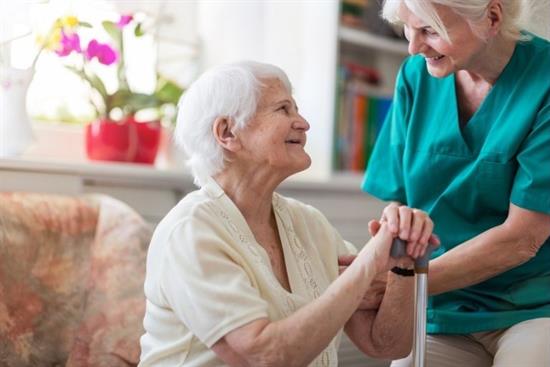WASHINGTON – Representatives Troy Balderson (R-OH) and Donna Shalala (D-FL) today introduced legislation that would allow flexibility for hospice caregivers during public health emergencies, including the current COVID-19 pandemic. The bipartisan, bicameral COVID-19 Hospice Respite Care Relief Act would extend the current five-day limit for respite care coverage provided by Medicare to 15 days in the event a hospice patient’s primary caregiver is unable to provide care due to illness or isolation during any public health emergency.
“Caring for a hospice patient is a full-time responsibility, so when a caregiver gets sick or is awaiting test results, it’s critical they have proper coverage” said Balderson. “During the current public health emergency and any future public health emergencies, it’s important caregivers – often times a patient’s family member – are able to fully recover and that end-of-life patients are not unnecessarily exposed to health risks.”
In addition to providing authority to extend the five-day respite care limit to 15 days, the COVID-19 Hospice Respite Care Relief Act would allow respite care to be provided in patients’ places of residence, reducing potential exposure to COVID-19. This would be a change from current mandates that require patients eligible for Medicare hospice respite benefits to receive said care as an inpatient.
“The pandemic has placed heavy toll on the mental and physical health of hospice caregivers,” said Shalala. “This bipartisan legislation will help give caregivers the time they need to rest and recover during any future public health emergency and improve the care of hospice patients.”
Senator Sherrod Brown (D-OH) previously introduced bipartisan companion legislation in the U.S. Senate.
“Respite flexibility for caregivers – who are more often than not, family members of hospice patients – provides a necessary break from a job that requires round-the-clock vigilance,” said Brown. “The best ideas don’t come from Washington, they come from hardworking Ohioans on the front lines every day. This idea was brought to me by hospice providers in Ohio, and I’m glad to work with my House colleagues on this legislation to provide them with the additional resources, flexibility, and support they need during this unprecedented pandemic.”
This legislation is endorsed by Ohio’s Hospice, LeadingAge Ohio, the National Association of Home Care and Hospice, the National Hospice Cooperative, the National Hospice and Palliative Care Organization, the National Partnership for Hospice Innovation, the Visiting Nurse Associations of America, ElevatingHOME, and Hospice of the Western Reserve.
“We are grateful that Representative Balderson has chosen to lead in supporting the unsung heroes on the frontlines of healthcare,” said LeadingAge Ohio president and CEO Kathryn Brod. “This legislation will provide crucial flexibilities to family caregivers, and shows appreciation and respect for the selfless job they do. Ultimately, this bill will help more individuals remain in their home for their final days.”
“Ohio’s Hospice greatly appreciates the legislation put forth by U.S. Representative Troy Balderson and U.S. Representative Donna Shalala, regarding the use of respite care for hospice patients as defined in the Medicare hospice benefit,” said Kent Anderson and Amy Wagner, CEO and President of Ohio’s Hospice. “Through the ongoing public health emergency, as well with all Americans, hospice patients and family caregivers have been subjected to the new coronavirus and the risks associated with it. The language contained in the proposed legislation allows flexibility in the use of the respite level of care. It expands the location of respite care to include a patient’s home, and it will help maintain patient safety by allotting time for family and caregivers to respond to COVID-19 and its many concerns. This legislation, along with its sister bill in the Senate (S. 4423), will stretch a critical resource for hospice providers, allowing them to support a safer environment of care.’
BACKGROUND
Medicare beneficiaries receiving hospice services and their caregiver(s) are eligible for short-term, inpatient, respite care services. Medicare will cover respite care if the hospice beneficiary’s primary caregiver – most often a family member – is ill, needs rest, or is otherwise unable to care for the hospice patient. Under current law, beneficiaries are limited to accessing respite care in an inpatient facility – such as a hospital, hospice inpatient center, or nursing home – as well as using the benefit in five-day increments.
The existing limitations on Medicare’s hospice respite benefit have made it difficult for family caregivers to take advantage of this critical benefit during the COVID-19 pandemic. For caregivers who may be diagnosed with COVID-19 or who may wish to quarantine for two weeks after being exposed to the virus, the current five-day respite care benefit is insufficient to allow caregivers to take much-needed rest and protect hospice beneficiaries from potential exposure.
Some families are also reluctant to use the respite benefit because doing so would mean moving their loved one into a congregate living facility – such as a hospital or nursing home – where there may be a greater risk of contracting the virus. In addition, caregivers may also be hesitant to welcome their loved ones back home after an inpatient stay or are having trouble finding a safe discharge location due to fear of the hospice patient’s potential exposure to COVID-19.
The COVID-19 Hospice Respite Care Relief Act of 2020 would provide the Secretary of Health and Human Services (HHS) with the authority to make the hospice respite care benefit more flexible during any public health emergency, including the current COVID-19 pandemic. This legislation would allow the HHS Secretary to waive the existing benefit in the following two ways:
- Authority to waive the 5-day maximum for respite care when the caregiver is unable to provide care due to illness or isolation, for up to 15 days.
- Authority to waive the requirement that respite care only be provided in the inpatient setting, making the hospice respite benefit available to hospice patients in their place of residence, thereby keeping the patient safe and reducing exposure to COVID-19.
|
###


